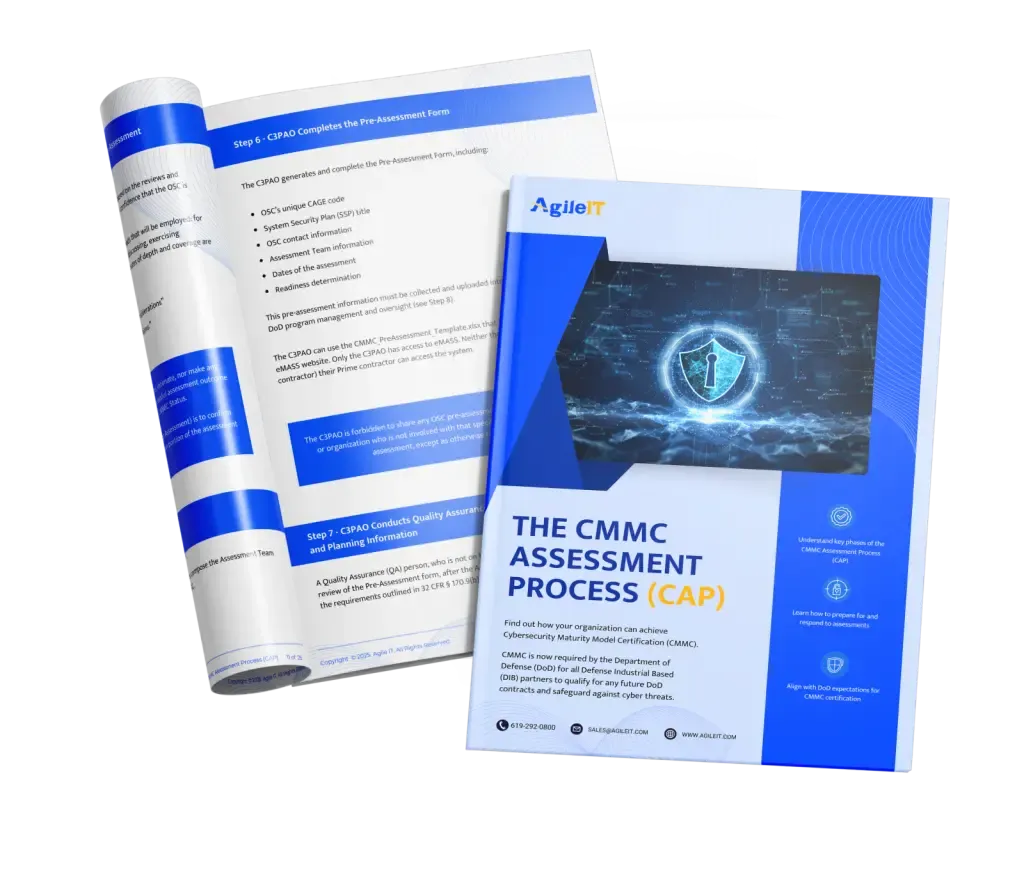Overview of CUI Compliance and the Role of MSPs
Explore the essentials of CUI compliance and how MSPs support DFARS, NIST 800-171, and ITAR requirements through secure IT services and expert guidance.

This is Post #4 of our CUI Compliance with MSPs Series
If you missed the earlier posts, start here to get the full picture:

For government contractors, securing any sensitive government data they handle is essential to ensure compliance and maintain national security. This is particularly crucial for organizations that handle, transmit, or store Controlled Unclassified Information (CUI). While CUI is not classified, this data is still considered sensitive enough to threaten national interests should it fall into the wrong hands. As such, the Department of Defense (DoD) has developed specific regulations governing how government contractors, and in particular those within the Defense Industrial Base (DIB), should protect CUI.
If you have government contracts, it is essential that you maintain compliance with these regulations, or risk losing your contracts and/or facing penalties. Yet, if you’re new to the world of CUI compliance, you may be unsure where to start your compliance journey, or what regulations apply to your organization. Fortunately, this is where an IT managed service provider (MSP) can help. An MSP experienced in federal compliance frameworks can be essential in helping you navigate your compliance obligations. Yet, if you’ve never worked with an MSP, you may be unsure whether this is the right choice for your company. Keep reading as we take a look at the compliance requirements for organizations handling CUI, and how an MSP can help you achieve compliance.
Understanding CUI Compliance Requirements
When deciding whether to work with an MSP to help you on your compliance journey, you must first understand what federal compliance requirements apply to you. Ultimately, this will depend on a variety of factors, including what federal agency you’re working with, as well as the terms of your contract (as your contract may outline which frameworks you must adhere to). However, the most common compliance requirements that apply to organizations handling CUI include:
-
NIST SP 800-171 : NIST SP 800-171 titled “Protecting Controlled Unclassified Information in Nonfederal Systems and Organizations” is a framework that establishes security requirements for all nonfederal organizations handling CUI.
-
DFARS 252.204-7012 : Is a clause in the Defense Federal Acquisition Regulation Supplement (DFARS) that requires contractors and subcontractors that handle CUI to implement the security controls in NIST SP 800-171 and report cyber incidents within 72 hours.
-
ITAR : The International Traffic in Arms Regulations (ITAR) is a federal regulation that controls the import and export of defense-related articles, technologies, and services with the goal of safeguarding national security and foreign policy objectives. Organizations handling items on the United States Munitions List, must adhere to strict security standards outlined in ITAR or face fines, penalties, and loss of contracts.
Challenges Organizations Face With CUI Compliance
Organizations that handle CUI as part of their work with the government can face significant challenges when trying to achieve and maintain compliance, especially if they attempt to handle compliance in-house. Some of the most common challenges these organizations face include:
-
Limited Internal Expertise: For many new government contractors, it is common for their team to have little or no experience with federal compliance frameworks, which can make achieving compliance an overwhelming prospect.
-
Complex and Evolving Requirements: Even if some of your team members have experience with CUI compliance, you may still face challenges due to the ever-evolving compliance landscape. The fact is that recent years have seen the compliance requirements for handling CUI rapidly evolve as the federal government tries to stay ahead of malicious actors and streamline how federal agencies and their contractors handle CUI. However, for organizations with limited resources, this fast-paced compliance landscape can present numerous challenges.
-
Need for Secure Environments and Controls: In order to properly secure CUI and maintain compliance, contractors must secure their environment by implementing the security controls outlined in NIST SP 800-171. However, with NIST SP 800-171 containing 110 security controls across 14 families, achieving compliance can be a daunting prospect.
-
Scoping CUI: In order to properly secure the CUI they handle, government contractors must first scope their environment and identify where CUI is processed and stored on their network. However, determining what is/isn’t CUI, and where all CUI exists on one’s network, can be a time-consuming process.
-
Resource Constraints: Another significant challenge organizations face with CUI compliance is that many have limited resources. In particular, small government contractors often have limited budgets and manpower, making it difficult to find the time (and money) to implement the necessary security controls and train their staff on proper CUI management.
These challenges can make the prospect of achieving CUI compliance feel overwhelming for many government contractors, particularly if they have limited compliance knowledge and resources. The good news is that working with an MSP can provide these organizations with the resources they need to properly secure the CUI they handle, without breaking the bank.
The Role of MSPs in CUI Compliance
For government contractors with limited resources and minimal compliance knowledge, partnering with an experienced MSP can be essential in ensuring that they meet their compliance obligations. The fact is that an MSP can prove instrumental to your compliance journey by reducing your compliance burden as well as the costs associated with maintaining compliance. Just a few of the ways an MSP can reduce your compliance burden include by:
- Delivering Compliant Infrastructure
- Managing Technical Controls and Policies
- Performing Gap Assessments
- Roadmap Development
- Providing Ongoing Training
- Performing Ongoing Monitoring and Incident Response
What to Look for in an MSP Partner
Working with an MSP is the best way to ensure your compliance process goes as smoothly as possible. The fact is that the right compliance partner can help walk you through your compliance obligations and ensure that you take the proper steps to secure the CUI your organization handles. Yet, this may leave you wondering how you can ensure that you choose the right MSP for your compliance needs. To help get you started, here’s a look at a few things you should look for in an MSP:
-
CMMC and NIST Experience : The most important thing that you should look for is an MSP is experience working with federal frameworks such as NIST SP 800-171, CMMC 2.0, and DFARS. The fact is that not all MSPs have compliance experience, making it essential that you ask any MSP about their experience handling the compliance frameworks that apply to your organization.
-
Government Cloud Credentials : Part of achieving compliance includes ensuring that any cloud environment you use has the proper security and compliance features to protect the CUI you handle. For many government contractors, this means migrating to Microsoft Government Community Cloud (GCC) High. Yet, purchasing and migrating to GCC High can be a complex process, and you may need support to ensure this process goes smoothly. You should then consider working with an MSP who is also an authorized GCC High reseller, as they can prove instrumental in facilitating your migration.
-
Proven Track Record in Regulated Industries : Of course, before partnering with an MSP, you should also ensure that they actually have the experience in compliance that they claim they do. Make sure that you ask any MSP you’re considering working with for references and case studies that prove their track record in regulated industries.
Partner With Agile IT for Expert Compliance Support
Taking the time to find an MSP experienced in the ever-evolving CUI compliance landscape can be a game-changer for government contractors, as the right compliance partner can help reduce your compliance burden. However, to ensure your compliance journey goes as smoothly as possible, it is important that you take the time to properly evaluate any MSP you’re considering working with to ensure that they have the proper knowledge and experience.
If you’re in need of a CUI compliance partner you can trust, look no further than Agile IT. Not only do we have experience working with a wide range of federal frameworks, including NIST SP 800-171, DFARS 7012, CMMC 2.0, and ITAR, but we are also a Microsoft AOS-G partner and a Cyber AB authorized RPO. No matter what your compliance needs are, our experienced team has the knowledge, experience, and certifications to help walk you through this complex process. Feel free to contact us today to learn about our managed services for government contractors.






